
Related
Guests
- Frederick LawrenceCEO of the Phi Beta Kappa Society and former president of Brandeis University.
We look at how university administrators have responded to Palestine solidarity protests by students with Frederick Lawrence, former president of Brandeis University and now the CEO of the Phi Beta Kappa Society and a lecturer at Georgetown Law School. Brandeis was founded in 1948 by the American Jewish community in the wake of the Holocaust and named after the first Jewish Supreme Court justice, the celebrated free speech advocate Louis Brandeis. Lawrence says the nationwide university crackdown on student protesters is a worrying violation of the principles of academic freedom. “Provoking people, challenging people, asking difficult questions, making people uncomfortable, that’s part of the price of living in a democracy,” he says. He also notes that what constitutes a threat to campus safety should be narrowly defined. “You are not entitled to be intellectually safe. You are entitled to be physically safe.”
Transcript
AMY GOODMAN: This is Democracy Now!, democracynow.org, The War and Peace Report. I’m Amy Goodman, with Nermeen Shaikh.
NERMEEN SHAIKH: As we continue to look at the widening police crackdown on pro-Palestinian student protests, we’re joined now in Washington, D.C., by Frederick Lawrence, the former president of Brandeis University, which was founded in 1948 by the American Jewish community in the wake of the Holocaust. Frederick Lawrence is also the former dean of the George Washington University Law School and a former visiting professor and senior research scholar at Yale Law School.
AMY GOODMAN: Frederick Lawrence, welcome to Democracy Now! It’s great to have you with us. You just heard our first segment, what’s happening right now, police raiding UCLA campus, dismantling the Gaza encampment and arresting students. You heard about the counterprotesters attacking the journalists and those in the encampment. And then, of course, we just came out of the police doing the very same thing at Columbia University, dismantling the encampment and going into Hamilton Hall, that the students had occupied. Can you respond to what’s happening right now, and what you think should be the path and the response of universities around this country as students rise up in horror about what’s happening in Gaza?
FREDERICK LAWRENCE: I think when students rise up on any issues around the world or on their local communities, as well, universities have to begin with first principles. We exist for the purposes of creating and discovering knowledge. That requires free expression and protection for free expression. We talk about balancing free expression on the one hand, safety on the other. And although I understand that, it somewhat misses the point, which is to say safety is essential for campuses, but safety is instrumental to protect the fundamental goal, and that’s free expression.
So, in a case like what happened at UCLA, there’s an interesting example there of sometimes universities can do too much, but sometimes they can do too little. And clearly, one of the things that came across was the need for intervention sooner to protect the violence that was going on at UCLA. But I think I would even take the camera back a long way further and say that the real answer here is work that takes place a long time before these events happen. You have to build relationships on campus. You have to know who these student leaders and student groups are, so that the kinds of conflicts that we’re seeing now don’t happen the way that they’re being presented, but happen in a much more productive way for all concerned.
NERMEEN SHAIKH: And could you explain whether protocols — what are the ordinary, conventional protocols in place at universities dealing with protest, and whether those have changed in the last months since we’ve seen the Gaza protests begin?
FREDERICK LAWRENCE: I think different universities obviously approach this in different ways. But if you look at the ones that are the most productive, the most functional right now, they really cover a range of outcomes and a range of approaches.
Look at University of Chicago, where the president just put out a statement that said, “Here are the rules of engagement,” and that “You can stay out on the quad and encamp for certain lengths of time, but here are the guard rules. Anti-harassment rules still apply. You can’t threaten people. You can’t interrupt the functioning of the university. But you can have an encampment.” President of Williams College put out a statement roughly along the same lines. The president of Brown was involved in negotiations with students where I think they reached what appears to be a pretty good result. Did the students get everything they wanted? Of course not. And did the university get everything they wanted? Of course not.
You know, one of the biggest mistakes here is when you start to think about the students as “they” as opposed to “we.” There’s only one constituency here, and that’s the university. The faculty, the students, the staff, the administration, the trustees all have to think of themselves as “we” working together. As soon as it splinters into “they,” that’s when you start getting problems, and sometimes tragedies.
NERMEEN SHAIKH: And what about your response, Professor Lawrence, to what the university professors say, namely — sorry, the university administrations say, across the board, which is that they’re acting in the interest of students, Jewish students on campus, who feel they’re being threatened on campus? And as the crackdown on the student uprising has intensified, the House now has passed a bill to widen the federal definition of antisemitism. Critics of the bill included Jerry Nadler, the most senior Jewish member of Congress and a strong supporter of Israel. Nadler said, quote, “This bill threatens to chill constitutionally protected speech. Speech that is critical of Israel alone does not constitute discrimination. The bill sweeps too broadly,” Nadler said. Meanwhile, Republican lawmakers are vowing to launch new investigations into elite universities. Earlier this week, House Republican Whip Tom Emmer claimed, quote, “pro-terrorist antisemites taking over our college campuses.” So, if you could respond to that, what you think is actually going on, and how the Biden administration is responding, what’s happened in the House?
FREDERICK LAWRENCE: The most important thing is to focus on the limits on expression, which are pretty far out on the horizon. Free expression, free inquiry, academic freedom all have to be given broad range for protection. Where there’s actual threatening behavior, that can be restricted. That can be precluded. So, when you hear about talk of actual threatening behavior, I think there is a reason for the university to clamp down. But provoking people, challenging people, asking difficult questions, making people uncomfortable, that’s part of the price of living in a democracy, if you will. That’s what it means to live in a self-governing society.
Interrupting the actual functioning of the university, that can be precluded. You can’t block off buildings. You can’t keep students from getting into a library or into a classroom. But you can certainly create an encampment that might make it less comfortable for some students to get to class. Again, discomfort is not something that you should avoid in all cases in a university. Safety certainly should be provided. So I think that’s the balance that universities have to strike. And on some campuses, they have to do a better job of striking that balance.
AMY GOODMAN: And this is particularly interesting coming from you, Frederick Lawrence. If you can talk about the history of the founding of Brandeis University, and also your concern? I mean, it’s the issue you’re talking about right now, when Jewish students say they’re made to feel uncomfortable, and so you have the House acting and calling just — you’ll even have of the networks, when they say they feel threatened, just showing a Palestinian flag or a person wearing a keffiyeh. What that means?
FREDERICK LAWRENCE: We have been far too loose with what we mean by threatened, and not just in the past few months, but in the past few years. Many people feel that when they hear views that they deeply disagree with, that’s threatening to them. That’s not how universities operate. You are not entitled to be intellectually safe. You are entitled to be physically safe. So, where there are actual threats, certainly people are entitled to be protected, hopefully by university procedures, and by university security only as a last resort, with public officials and with police in riot gear. Hopefully, that’s always a last resort. But anything short of that, which is to say that which challenges one’s ideas, on any of the sides of these issues, that has to be part of an open conversation. Of course these are difficult conversations. Of course these issues are fraught.
Look, let me give you an example of one that worked recently that I was involved in. I was what was called a free expression resident at Skidmore College, upstate New York, for several days, met with a number of groups, but in particular had about an hour with a group of Jewish students and a group of Muslim students talking about Israel-Palestine, talking about what’s going on in Gaza. It was not an easy conversation. It was a hard conversation. But at the same time, we made some progress. I heard from the president of the college last night that he has continued to meet with these students, and he feels as if, in his words, it’s an air of cooperation, not antagonism. That’s the model that we’re looking for, that I think we should see on more campuses.
AMY GOODMAN: And the point of the founding of Brandeis University, why your voice is particularly important right now?
FREDERICK LAWRENCE: It’s Brandeis University, named for Justice Louis Brandeis, Justice Louis Brandeis who famously said, “In the absence of incitement of lawless activity, of imminent lawless activity, the answer to speech you disagree with is more speech, not enforced silence.” And Brandeis would have said that on any side of any issue. You cannot permit incitement of imminent lawless activity, but you have to protect the ability to express a wide range of views. Brandeis University has always been dedicated to that. That’s one of the reasons that, as its president, I was proud to advocate for free expression on a wide level. At the same time, the limits come, as I say, where safety is involved or where the orderly operation of the university is involved. Those things have to be protected.
AMY GOODMAN: Frederick Lawrence, we want to thank you for being with us, former president of Brandeis University, also the former dean of the George Washington University Law School and former visiting professor and senior research scholar at Yale Law School. He’s currently the CEO of the Phi Beta Kappa Society and distinguished lecturer at Georgetown Law School.
Next up, Amnesty International is calling on the Biden administration to immediately halt arms sales to Israel. We’ll go to Jerusalem. Back in 20 seconds.

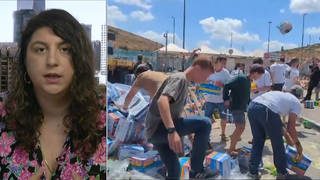
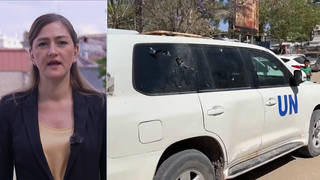
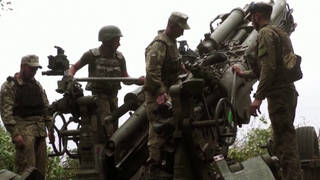
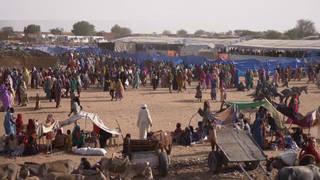
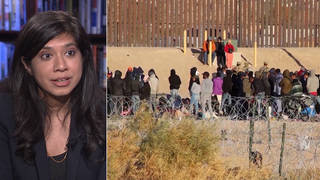




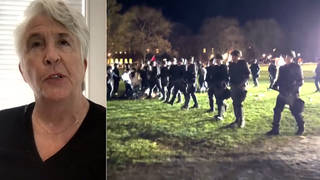
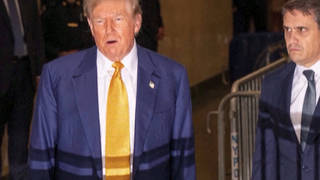
Media Options